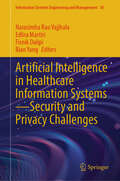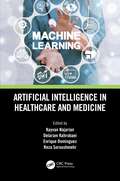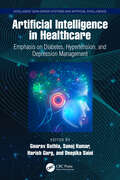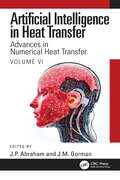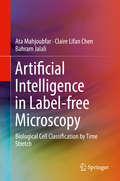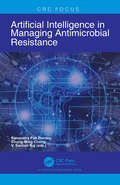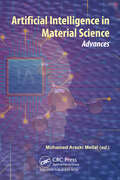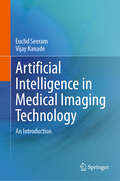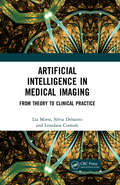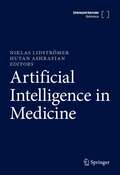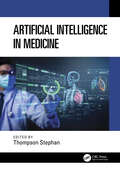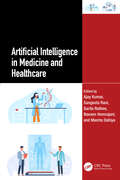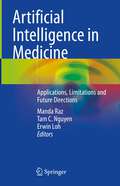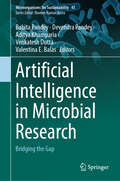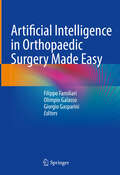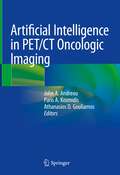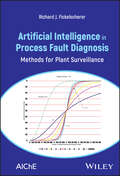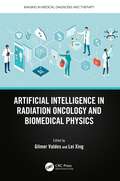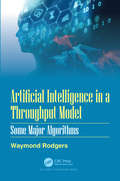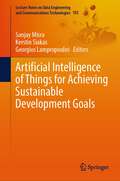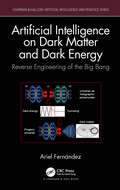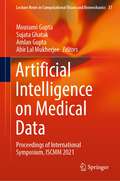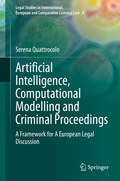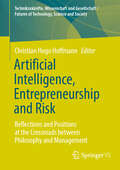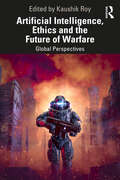- Table View
- List View
Artificial Intelligence in Healthcare Information Systems—Security and Privacy Challenges (Information Systems Engineering and Management #34)
by Narasimha Rao Vajjhala Edlira Martiri Fisnik Dalipi Bian Yang“Artificial Intelligence (AI) in Healthcare Information Systems: Security and Privacy Challenges” offers a deep dive into the integration of AI in healthcare, with a primary focus on addressing the significant security and privacy concerns that arise in this domain. The chapters in this book highlight the transformative potential of AI in diagnosing and predicting diseases, as well as its impact on fields like fetal medicine, but places special emphasis on the need for robust encryption, data protection techniques, and ethical considerations to safeguard sensitive healthcare data. The book also explores global case studies, from India to Kazakhstan, outlining the challenges and prospects of AI adoption in diverse healthcare settings. Readers will gain insights into AI's role in improving patient outcomes while navigating the complexities of data privacy and security. The book is a valuable resource for healthcare professionals, technologists, and policymakers who are focused on implementing AI-driven solutions securely and ethically in healthcare systems.
Artificial Intelligence in Healthcare and Medicine
by Kayvan NajarianThis book provides a comprehensive overview of the recent developments in clinical decision support systems, precision health, and data science in medicine. The book targets clinical researchers and computational scientists seeking to understand the recent advances of artificial intelligence (AI) in health and medicine. Since AI and its applications are believed to have the potential to revolutionize healthcare and medicine, there is a clear need to explore and investigate the state-of-the-art advancements in the field. This book provides a detailed description of the advancements, challenges, and opportunities of using AI in medical and health applications. Over 10 case studies are included in the book that cover topics related to biomedical image processing, machine learning for healthcare, clinical decision support systems, visualization of high dimensional data, data security and privacy, bioinformatics, and biometrics. The book is intended for clinical researchers and computational scientists seeking to understand the recent advances of AI in health and medicine. Many universities may use the book as a secondary training text. Companies in the healthcare sector can greatly benefit from the case studies covered in the book. Moreover, this book also: Provides an overview of the recent developments in clinical decision support systems, precision health, and data science in medicine Examines the advancements, challenges, and opportunities of using AI in medical and health applications Includes 10 cases for practical application and reference Kayvan Najarian is a Professor in the Department of Computational Medicine and Bioinformatics, Department of Electrical Engineering and Computer Science, and Department of Emergency Medicine at the University of Michigan, Ann Arbor. Delaram Kahrobaei is the University Dean for Research at City University of New York (CUNY), a Professor of Computer Science and Mathematics, Queens College CUNY, and the former Chair of Cyber Security, University of York. Enrique Domínguez is a professor in the Department of Computer Science at the University of Malaga and a member of the Biomedical Research Institute of Malaga. Reza Soroushmehr is a Research Assistant Professor in the Department of Computational Medicine and Bioinformatics and a member of the Michigan Center for Integrative Research in Critical Care, University of Michigan, Ann Arbor.
Artificial Intelligence in Healthcare: Emphasis on Diabetes, Hypertension, and Depression Management (Intelligent Data-Driven Systems and Artificial Intelligence)
by Harish Garg Deepika Saini Gourav Bathla Sanoj KumarThis book presents state-of-the-art research works for a better understanding of the advantages and limitations of AI techniques in the field of healthcare. It will further discuss artificial intelligence applications in depression, hypertension and diabetes management. The text also presents an artificial intelligence chatbot for depression, diabetes, and hypertension self-help.This book: Provides a structured overview of recent developments of artificial intelligence applications in the healthcare sector. Presents an in-depth understanding of how artificial intelligence techniques can be applied to diabetes management. Showcases supervised learning techniques based on datasets for depression management. Discusses artificial intelligence chatbot for diabetes, depression, and hypertension self-care. Highlights the importance of artificial intelligence in managing and predicting diabetes, hypertension, and depression. The text is primarily written for senior undergraduate, graduate students, and academic researchers in diverse fields including electrical engineering, electronics and communications engineering, computer science and engineering, and biomedical engineering.
Artificial Intelligence in Heat Transfer: Advances in Numerical Heat Transfer Volume VI
by J. M. Gorman J. P. AbrahamArtificial Intelligence in Heat Transfer shows how artificial intelligence (AI) tools and techniques, such as artificial neural networks, machine learning algorithms, genetic algorithms, etc., provide practical benefits specific to thermal sciences. It presents case studies involving heat and mass transfer, multi-objective optimization, conjugate heat transfer, nanofluids, thermal radiation, heat transfer through porous media (metal foam), and more.Drawing on the collective expertise of leading researchers and experts in multiple fields, the book provides an in-depth understanding of the possibilities that emerge when these tools are applied to problems related to thermal sciences. AI is an ever-evolving discipline that has created new and groundbreaking opportunities to advance the mechanical engineering field, particularly in the area of numerical heat transfer. This volume, Advances in Numerical Heat Transfer, explores various ways AI is used in heat transfer to solve engineering problems.This book will serve as an important resource for upper-level undergraduate students, researchers, engineers, and professionals, equipping them with the knowledge and inspiration to push the boundaries of the thermal sciences through AI-driven tools and techniques.
Artificial Intelligence in Label-free Microscopy: Biological Cell Classification by Time Stretch
by Ata Mahjoubfar Claire Lifan Chen Bahram JalaliThis book introduces time-stretch quantitative phase imaging (TS-QPI), a high-throughput label-free imaging flow cytometer developed for big data acquisition and analysis in phenotypic screening. TS-QPI is able to capture quantitative optical phase and intensity images simultaneously, enabling high-content cell analysis, cancer diagnostics, personalized genomics, and drug development. The authors also demonstrate a complete machine learning pipeline that performs optical phase measurement, image processing, feature extraction, and classification, enabling high-throughput quantitative imaging that achieves record high accuracy in label -free cellular phenotypic screening and opens up a new path to data-driven diagnosis.
Artificial Intelligence in Managing Antimicrobial Resistance
by Ramendra Pati Pandey Chung-Ming Chang V. Samuel RajThis volume reviews the use of machine learning (ML) to predict antibiotic resistance in pathogens based on gene content and genome composition as data sets comprising hundreds or thousands of pathogen genomes become available. One of the main goals of this work is to promote the use of ML in front-line contexts while simultaneously emphasizing the additional improvements that are required to use these techniques in a secure and confident manner. Given the variety of quantitative and qualitative laboratory indicators of AMR, the issue of what to anticipate is not an easy one.This book is intended for academia, students of medical science, microbiology, biology, and biotechnology, as well as experts and scientists working in the fields of infectious diseases, government health organizations, and medicine.
Artificial Intelligence in Material Science: Advances
by Mohamed Arezki MellalArtificial intelligence (AI) in the form of machine learning and nature-inspired optimization algorithms are vastly used in material science. These techniques improve many quality metrics, such as reliability and ergonomics.This book highlights the recent challenges in this field and helps readers to understand the subject and develop future works. It reviews the latest methods and applications of AI in material science. It covers a wide range of topics, including Material processing; Properties prediction; Conventional machining, such as turning, boring, grinding, and milling; non-conventional machining, such as electrical discharge machining, electrochemical machining, laser machining, plasma machining, ultrasonic machining, chemical machining, and water-jet machining; Machine tools, such as programming, design, and maintenance. AI techniques reviewed in the book include Machine learning, Fuzzy logic, Genetic algorithms, Particle swarm optimization, Cuckoo search, Grey wolf optimizer, and Ant colony optimization.
Artificial Intelligence in Medical Imaging Technology: An Introduction
by Euclid Seeram Vijay KanadeThis book covers the principles, concepts, and applications of artificial intelligence in medical imaging technologies, specifically in the context of diagnostic imaging, such as radiography and radiological technology. First, artificial intelligence and its subsets machine learning and deep learning are described followed by a discussion of applications of these AI principles in medical imaging technologies. Finally, ethical questions, regulatory aspects, and future trends and challenges are also reviewed in this textbook. This book is intended for both students and practitioners in radiological technology, radiography, radiation therapy, nuclear medicine technology, diagnostic medical sonography, and biomedical engineering technology. Furthermore, residents in radiology, and medical physics students and related healthcare personnel (administrators and managers for example) may find this book useful.
Artificial Intelligence in Medical Imaging: From Theory to Clinical Practice
by Lia Morra Silvia Delsanto Loredana CorrealeChoice Recommended Title, January 2021 This book, written by authors with more than a decade of experience in the design and development of artificial intelligence (AI) systems in medical imaging, will guide readers in the understanding of one of the most exciting fields today. After an introductory description of classical machine learning techniques, the fundamentals of deep learning are explained in a simple yet comprehensive manner. The book then proceeds with a historical perspective of how medical AI developed in time, detailing which applications triumphed and which failed, from the era of computer aided detection systems on to the current cutting-edge applications in deep learning today, which are starting to exhibit on-par performance with clinical experts. In the last section, the book offers a view on the complexity of the validation of artificial intelligence applications for commercial use, describing the recently introduced concept of software as a medical device, as well as good practices and relevant considerations for training and testing machine learning systems for medical use. Open problematics on the validation for public use of systems which by nature continuously evolve through new data is also explored. The book will be of interest to graduate students in medical physics, biomedical engineering and computer science, in addition to researchers and medical professionals operating in the medical imaging domain, who wish to better understand these technologies and the future of the field. Features: An accessible yet detailed overview of the field Explores a hot and growing topic Provides an interdisciplinary perspective
Artificial Intelligence in Medicine
by Hutan Ashrafian Niklas LidströmerThis book provides a structured and analytical guide to the use of artificial intelligence in medicine. Covering all areas within medicine, the chapters give a systemic review of the history, scientific foundations, present advances, potential trends, and future challenges of artificial intelligence within a healthcare setting. Artificial Intelligence in Medicine aims to give readers the required knowledge to apply artificial intelligence to clinical practice. The book is relevant to medical students, specialist doctors, and researchers whose work will be affected by artificial intelligence.
Artificial Intelligence in Medicine
by Thompson StephanIn the ever-evolving realm of healthcare, Artificial Intelligence in Medicine emerges as a trailblazing guide, offering an extensive exploration of the transformative power of Artificial Intelligence (AI). Crafted by leading experts in the field, this book sets out to bridge the gap between theoretical understanding and practical application, presenting a comprehensive journey through the foundational principles, cutting-edge applications, and the potential impact of AI in the medical landscape.This book embarks on a journey from foundational principles to advanced applications, presenting a holistic perspective on the integration of AI into diverse aspects of medicine. With a clear aim to cater to both researchers and practitioners, the scope extends from fundamental AI techniques to their innovative applications in disease detection, prediction, and patient care.Distinguished by its practical orientation, each chapter presents actionable workflows, making theoretical concepts directly applicable to real-world medical scenarios. This unique approach sets the book apart, making it an invaluable resource for learners and practitioners alike.Key Features:• Comprehensive Exploration: From deep learning approaches for cardiac arrhythmia to advanced algorithms for ocular disease detection, the book provides an in-depth exploration of critical topics, ensuring a thorough understanding of AI in medicine.• Cutting-Edge Applications: The book delves into cutting-edge applications, including a vision transformer-based approach for brain tumor detection, early diagnosis of skin cancer, and a deep learning-based model for early detection of COVID-19 using chest X-ray images.• Practical Insights: Practical workflows and demonstrations guide readers through the application of AI techniques in real-world medical scenarios, offering insights that transcend theoretical boundaries.This book caters to researchers, practitioners, and students in medicine, computer science, and healthcare technology. With a focus on practical applications, this book is an essential guide for navigating the dynamic intersection of AI and medicine. Whether you are an expert or a newcomer to the field, this comprehensive volume provides a roadmap to the revolutionary impact of AI on the future of healthcare.
Artificial Intelligence in Medicine and Healthcare
by Ajay Kumar Mamta Dahiya Sangeeta Rani Sarita Rathee Naveen HemrajaniThis book is discussing artificial intelligence-based smart systems for diagnosis and prediction of diseases, artificial intelligence in clinical decision-making, and artificial intelligence tools for clinical and healthcare data. It further highlights the importance of 5G and 6G communication for telemedicine applications and applications of machine learning and deep learning in pandemic epidemiology.This book: Discusses artificial intelligence-inspired Internet of Things-based solutions, and machine learning modeling for smart healthcare Explains the use of computer vision, natural language processing in healthcare, and artificial intelligence in clinical decision-making Illustrates the role of artificial intelligence in telemedicine applications Examines medical image analysis using machine learning, and deep learning techniques It is primarily written for senior undergraduates, graduate students, and academic researchers in the fields including computer science and engineering, electronics and communications engineering, and biomedical engineering.
Artificial Intelligence in Medicine: Applications, Limitations and Future Directions
by Erwin Loh Manda Raz Tam C. NguyenThis book identifies Artificial Intelligence (AI) as a growing field that is being incorporated into many aspects of human life, including healthcare practice and delivery. The precision, automation, and potential of AI brings multiple benefits to the way disease is diagnosed, investigated and treated. Currently, there is a lack of any appreciable understanding of AI and this book provides detailed understandings, which include; foundational concepts, current applications, future challenges amongst most healthcare practitioners. The book is divided into four sections: basic concepts, current applications, limitations and future directions. Each section is comprised of chapters written by expert academics, researchers and practitioners at the intersection between AI and medicine. The purpose of the book is to promote AI literacy as an important component of modern medical practice. This book is suited for all readers as it requires no previous knowledge, it walks non-technical clinicians through the complex ideas and concepts in an easy to understand manner.
Artificial Intelligence in Microbial Research: Bridging the Gap (Microorganisms for Sustainability #45)
by Valentina E. Balas Aditya Khamparia Venkatesh Dutta Devendra Pandey Babita PandeyThis book explores the convergence of microbiology and artificial intelligence (AI) and delves into the intricate world of microbial systems enhanced by cutting-edge AI technologies. The book begins by establishing a foundation in the fundamentals of microbial ecosystems and AI principles. It elucidates the integration of AI in microbial genomics, demonstrating how advanced algorithms analyze genomic data and contribute to genetic engineering. Bioinformatics and computational microbiology are explored, showcasing AI's role in predictive modeling and computational tools. The intersection of AI and microbial applications extends to drug discovery, precision agriculture, and pathogen detection. Readers gain insights into AI-driven drug development, the optimization of agricultural practices using microbial biostimulants, and early warning systems for crop diseases. The book highlights AI's role in microbial biotechnology, elucidating its impact on bioprocessing, fermentation, and other biotechnological applications. Climate-smart agriculture and microbial adaptations to environmental challenges are discussed, emphasizing sustainable practices. This book caters to a diverse audience including teachers, researchers, microbiologist, computer bioinformaticians, plant and environmental scientists. The book serves as additional reading material for undergraduate and graduate students of computer science, biomedical, agriculture, human science, forestry, ecology, soil science, and environmental sciences and policy makers to be a useful to read.
Artificial Intelligence in Orthopaedic Surgery Made Easy
by Filippo Familiari Olimpio Galasso Giorgio GaspariniThis book is an essential reference guide for the use of artificial intelligence in orthopaedic surgery. It covers all related topics, from machine and deep learning, through practical applications in all orthopaedic sub-disciplines, to ethical issues and potential risks. International renowned experts equip the reader with solid scientific foundations and practical tips combining accurate literature reviews with high-quality original images. Addressing a hot topic for the present and next generation of medical specialists, this book is a must read for orthopaedic surgeons, radiologists and health informatic specialists alike.
Artificial Intelligence in PET/CT Oncologic Imaging
by Athanasios D. Gouliamos John A. Andreou Paris A. KosmidisThis book presents artificial intelligence applications that may help in detecting disease, defining tissue characterization (benign vs malignant), staging and correlation with molecular biomarkers. Originally positioned as a means for noninvasive molecular phenotyping and quantification in the 1970s, PET's technological improvements in the 2000s generated renewed interest in quantification, which has grown over the last five years. This progress is parallel with the development of Artificial intelligence (AI) systems for Oncology which aim at providing the best possible treatment to patients suffering from lung, breast, brain, prostate, liver and other types of cancer. The chapters provide an overview of the use of AI in PET/CT imaging for various types of cancer, and it will be an invaluable tool especially for nuclear medicine physicians and oncologists.
Artificial Intelligence in Process Fault Diagnosis: Methods for Plant Surveillance
by Richard J. FickelschererArtificial Intelligence in Process Fault Diagnosis A comprehensive guide to the future of process fault diagnosis Automation has revolutionized every aspect of industrial production, from the accumulation of raw materials to quality control inspections. Even process analysis itself has become subject to automated efficiencies, in the form of process fault analyzers, i.e., computer programs capable of analyzing process plant operations to identify faults, improve safety, and enhance productivity. Prohibitive cost and challenges of application have prevented widespread industry adoption of this technology, but recent advances in artificial intelligence promise to place these programs at the center of manufacturing process analysis. Artificial Intelligence in Process Fault Diagnosis brings together insights from data science and machine learning to deliver an effective introduction to these advances and their potential applications. Balancing theory and practice, it walks readers through the process of choosing an ideal diagnostic methodology and the creation of intelligent computer programs. The result promises to place readers at the forefront of this revolution in manufacturing. Artificial Intelligence in Process Fault Diagnosis readers will also find: Coverage of various AI-based diagnostic methodologies elaborated by leading expertsGuidance for creating programs that can prevent catastrophic operating disasters, reduce downtime after emergency process shutdowns, and moreComprehensive overview of optimized best practices Artificial Intelligence in Process Fault Diagnosis is ideal for process control engineers, operating engineers working with processing industrial plants, and plant managers and operators throughout the various process industries.
Artificial Intelligence in Radiation Oncology and Biomedical Physics (Imaging in Medical Diagnosis and Therapy)
by Lei Xing Gilmer ValdesThis pioneering book explores how machine learning and other AI techniques impact millions of cancer patients who benefit from ionizing radiation. It features contributions from global researchers and clinicians, focusing on the clinical applications of machine learning for medical physics. AI and machine learning have attracted much recent attention and are being increasingly adopted in medicine, with many clinical components and commercial software including aspects of machine learning integration. General principles and important techniques in machine learning are introduced, followed by discussion of clinical applications, particularly in radiomics, outcome prediction, registration and segmentation, treatment planning, quality assurance, image processing, and clinical decision-making. Finally, a futuristic look at the role of AI in radiation oncology is provided. This book brings medical physicists and radiation oncologists up to date with the most novel applications of machine learning to medical physics. Practitioners will appreciate the insightful discussions and detailed descriptions in each chapter. Its emphasis on clinical applications reaches a wide audience within the medical physics profession.
Artificial Intelligence in a Throughput Model: Some Major Algorithms
by Waymond RodgersPhysical and behavioral biometric technologies such as fingerprinting, facial recognition, voice identification, etc. have enhanced the level of security substantially in recent years. Governments and corporates have employed these technologies to achieve better customer satisfaction. However, biometrics faces major challenges in reducing criminal, terrorist activities and electronic frauds, especially in choosing appropriate decision-making algorithms. To face this challenge, new developments have been made, that amalgamate biometrics with artificial intelligence (AI) in decision-making modeling. Advanced software algorithms of AI, processing information offered by biometric technology, achieve better results. This has led to growth in the biometrics technology industry, and is set to increase the security and internal control operations manifold. This book provides an overview of the existing biometric technologies, decision-making algorithms and the growth opportunity in biometrics. The book proposes a throughput model, which draws on computer science, economics and psychology to model perceptual, informational sources, judgmental processes and decision choice algorithms. It reviews how biometrics might be applied to reduce risks to individuals and organizations, especially when dealing with digital-based media.
Artificial Intelligence of Things for Achieving Sustainable Development Goals (Lecture Notes on Data Engineering and Communications Technologies #192)
by Sanjay Misra Kerstin Siakas Georgios LampropoulosThis book covers various topics and trends regarding Artificial Intelligence (AI), Internet of Things (IoT), and their applications in society, industry, and environment for achieving Sustainable Development Goals (SDGs) suggested by the United Nations. Additionally, it discusses their advancements and fusion as well as the realization of Artificial Intelligence of Things (AIoT). The book aims to provide an overview and recent research into the fusion, integration, advancements, and impact of these technologies in the context of SDGs achievement. The topics include the applications of AI, IoT, big data, AI-based and IoT-based cloud computing, machine learning and deep learning techniques, and blockchain among others for achieving SDGs. It also presents findings and discussions on potential application domains, addresses open issues and challenges, offers solutions, and provides suggestions for future research for achieving SDGs. The chapters are clustered, according to particular SDGsor areas of focus, into: i) the realization of AIoT for SDGs, ii) the role of AIoT in achieving society and wellbeing-related SDGs, iii) the fulfillment of industrial sectors, infrastructure, and economy-related SDGs through AIoT, and iv) the use of AIoT to aid natural resources and environment-related SDGs. The book assists researchers, practitioners, professionals, and academicians of various scientific fields in exploring and better understanding these state-of-the-art technologies, their advancements, impact, future potentials and benefits, and their role in successfully achieving SDGs.The book:· Offers an in-depth overview of AIoT for achieving SDGs.· Presents the fusion of AI and IoT for bringing a significant change in everyday life and fulfilling SDGs.· Highlights innovative solutions and results of AIoT integration in several domains for achieving SDGs.· Showcases the influence of AIoT on promoting and improving sustainability in the context of SDGs.· Discusses the issues, benefits, solutions, and impact of AIoT in society, industry, and environment for achieving SDGs.
Artificial Intelligence on Dark Matter and Dark Energy: Reverse Engineering of the Big Bang (Chapman & Hall/CRC Artificial Intelligence and Robotics Series)
by Ariel FernándezAs we prod the cosmos at very large scales, basic tenets of physics seem to crumble under the weight of contradicting evidence. This book helps mitigate the crisis. It resorts to artificial intelligence (AI) for answers and describes the outcome of this quest in terms of an ur-universe, a quintessential compact multiply connected space that incorporates a fifth dimension to encode space-time as a latent manifold. In some ways, AI is bolder than humans because the huge corpus of knowledge, starting with the prodigious Standard Model (SM) of particle physics, poses almost no burden to its conjecture-framing processes. Why not feed AI with the SM enriched by the troubling cosmological phenomenology on dark matter and dark energy and see where AI takes us vis-à-vis reconciling the conflicting data with the laws of physics? This is precisely the intellectual adventure described in this book and – to the best of our knowledge – in no other book on the shelf. As the reader will discover, many AI conjectures and validations ultimately make a lot of sense, even if their boldness does not feel altogether "human" yet. This book is written for a broad readership. Prerequisites are minimal, but a background in college math/physics/computer science is desirable. This book does not merely describe what is known about dark matter and dark energy but also provides readers with intellectual tools to engage in a quest for the deepest cosmological mystery.
Artificial Intelligence on Medical Data: Proceedings of International Symposium, ISCMM 2021 (Lecture Notes in Computational Vision and Biomechanics #37)
by Mousumi Gupta Sujata Ghatak Amlan Gupta Abir Lal MukherjeeThis book includes high-quality papers presented at the Second International Symposium on Computer Vision and Machine Intelligence in Medical Image Analysis (ISCMM 2021), organized by Computer Applications Department, SMIT in collaboration with Department of Pathology, SMIMS, Sikkim, India, and funded by Indian Council of Medical Research, during 11 – 12 November 2021. It discusses common research problems and challenges in medical image analysis, such as deep learning methods. It also discusses how these theories can be applied to a broad range of application areas, including lung and chest x-ray, breast CAD, microscopy and pathology. The studies included mainly focus on the detection of events from biomedical signals.
Artificial Intelligence, Computational Modelling and Criminal Proceedings: A Framework for A European Legal Discussion (Legal Studies in International, European and Comparative Criminal Law #4)
by Serena QuattrocoloThis book discusses issues relating to the application of AI and computational modelling in criminal proceedings from a European perspective. Part one provides a definition of the topics. Rather than focusing on policing or prevention of crime – largely tackled by recent literature – it explores ways in which AI can affect the investigation and adjudication of crime. There are two main areas of application: the first is evidence gathering, which is addressed in Part two. This section examines how traditional evidentiary law is affected by both new ways of investigation – based on automated processes (often using machine learning) – and new kinds of evidence, automatically generated by AI instruments. Drawing on the comprehensive case law of the European Court of Human Rights, it also presents reflections on the reliability and, ultimately, the admissibility of such evidence. Part three investigates the second application area: judicial decision-making, providing an unbiased review of the meaning, benefits, and possible long-term effects of ‘predictive justice’ in the criminal field. It highlights the prediction of both violent behaviour, or recidivism, and future court decisions, based on precedents. Touching on the foundations of common law and civil law traditions, the book offers insights into the usefulness of ‘prediction’ in criminal proceedings.
Artificial Intelligence, Entrepreneurship and Risk: Reflections and Positions at the Crossroads between Philosophy and Management (Technikzukünfte, Wissenschaft und Gesellschaft / Futures of Technology, Science and Society)
by Christian Hugo HoffmannThis book embarks on a thought-provoking journey that seeks to illuminate the intricate connections between the dynamic realms of AI, Entrepreneurship and Risk Management. This book illuminates the philosophical foundations of AI, examines the fundamental beliefs surrounding AI's nature, and its effects for the human condition. Drawing on the works of eminent philosophers, economists and business leaders alike, the authors of this volume engage in inspirational discussions on ethics, philosophy of technology, and the potential societal ramifications of advancing AI technologies. By grounding the exploration in philosophical reflections, the authors set the stage for a comprehensive understanding of AI's role in entrepreneurship and the inherent risks it entails.
Artificial Intelligence, Ethics and the Future of Warfare: Global Perspectives
by Kaushik RoyThis volume examines how the adoption of AI technologies is likely to impact strategic and operational planning, and the possible future tactical scenarios for conventional, unconventional, cyber, space and nuclear force structures. In addition to developments in the USA, Britain, Russia and China, the volume also explores how different Asian and European countries are actively integrating AI into their military readiness. It studies the effect of AI and related technologies in training regimens and command structures. The book also covers the ethical and legal aspects of AI augmented warfare.The volume will be of great interest to scholars, students and researchers of military and strategic studies, defence studies, artificial intelligence and ethics.
